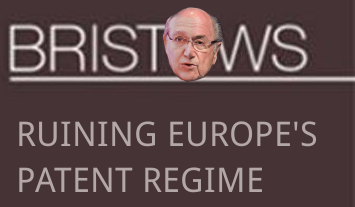

ANONYMITY is often required when blowing the whistle (e.g. about EPO misconduct). It is also sometimes used or misused when someone wishes to spread lies (or libel) without facing accountability.
"Bristows is a villainous firm which we wrote many articles about; it's not a witch-hunt but merely a reaction to a big load of misinformation and sometimes fabrication."On Saturday morning this blog post turned up; this time it was published by the anonymous “Kluwer Patent blogger” (not for the first time). It's about something which was first mentioned by Bristows (rebuttals soon surfaced) and it's yet another one of those posts which we assume got written by Bristows, then published with the veil of anonymity. Anonymous "Kluwer Patent blogger" typically sounds just like copy-paste from Bristows' blog and it's often also linking to Bristows' own blog as "proof" of the claims. To demonstrate that this latest blog post is likely from Bristows itself, we took only one portion of text from this paragraph and our very first attempt netted a "plagiarism" match. This very first attempt took text from the following paragraph:
Over the last months of 2017, the UPCA ratification procedure in the UK progressed considerably. The last remaining piece of legislation that must be passed in order for the UK to be able to ratify the UPC Agreement, the draft Unified Patent Court (Immunities and Privileges) Order 2017, is expected to be on the agenda of the Privy Council meeting of February 2018. If the Privy Council approves it, the UK will be in a position to ratify the UPCA.